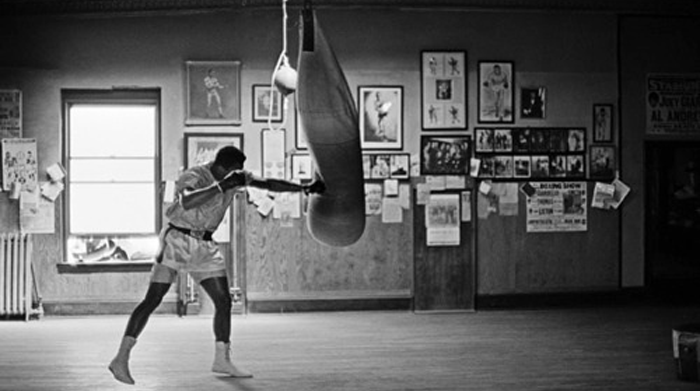My brothers and I used to split a shiny red pair of Everlast boxing gloves and fight each other as children. We loved it! It was half fun, half serious (which appealed to my character).
Later on as I grew older, I decided to pursue boxing competitively. I wanted to assess my limits.
Boxing taught me more about myself than any other sport. I learned that I was 'strong', but not the kind of 'tough' one discovers in a regular gym (People moved when I hit them).
Even though I could lift heavy weights and run a couple of miles, I discovered that I was out of shape for a fighter. Possessing mass, both muscle and fat, comes with a price. Most people do not have the energy to fuel a body to dance and fight for more than a round or two. Some fighters look like bodybuilders but tire easily within a few rounds. Some fighters resemble sumo wrestlers but can move and hit targets with precision and ease. This lesson took some time to figure out, but basically each person has an optimal body mass that once achieved they are able to deliver maximum power and speed with prolonged endurance (within six weeks I lost and kept off about 40lbs).
Many boxers are labeled cocky or arrogant. While this generalization may hold some truth, boxing demands full belief in one's ability to conquer and dominate lest they become the conquered. This is where psychology enters into the equation. Most (if not all) fights are won before it has even begun. Fear creeps in and implants negative notions These notions range between fear of appearing foolish to actually fearing the pain of getting hurt. So instead of fighting to 'win' one fights to 'not lose'. The fear of losing is what drives the fighter and ironically leads to loss.
Anyone who has spent some time boxing knows that physical pain isn't really that bad. Aside from traumatic brain injury, a broken nose can actually do some good. One learns that fear is worse than the sting of reality. Once again, your mind works against you to protect you from consciously walking into danger (it's counter-intuitive to seek out physical combat, see "fight or flight instinct").
One must know that they are going to both receive and dole out punishment. They must learn to control the part of their brain that is signalling them to take "flight". Boxing forces one to deal with reality by living in the present moment. Reality is hitting you in the face (quite literally), and you must stay calm, react, and make decisions under pressure. Sometimes you win, sometimes you lose. This is the most difficult part for any fighter to truly internalize and apply. It's a beautiful metaphor for life. Young fighters tend to rush in and overwhelm their opponents without thinking about the long term which can leave them with scars into their future. Experienced fighters are better aware of their limits and can exercise caution if the stakes are not worth the risk. Boxing is the art of hitting and not getting hit.
One of the reasons I chose boxing was to help me manage my anger. In the beginning, I could often over power and intimidate my opponents into submission. I noticed that when I fought smaller, more experienced fighters that my rage worked against me and would leave me exhausted, vulnerable, and susceptible to defeat. Eventually I started to appreciate the skills involved and began focusing on controlling my aggression in favor of cunning and technique. Boxing had given me the gift of self control and I prospered. I had strength, energy, and the control to use them.
Fighting for me was no longer about defeating another, but rather conquering myself. I was given a gift that allowed me to soar and be free. Something I wish to share with the World. Everyone has some kind of battle they are fighting, and the skills gained from boxing can directly transfer in helping these individuals overcome and 'Win'. In other words, fighting for the sake of fighting only serves the ego; whereas, fighting for a cause serves to rally and encourage others to boldly challenge their opponents whether in or out of the ring.
What makes a fighter heroic is their attitude/spirit towards winning despite the odds of harm. Call it cocky, arrogant, or foolish, but not everyone can handle this pressure.
“Be not afraid of greatness. Some are born great, some achieve greatness, and others have greatness thrust upon them.”
― William Shakespeare, Twelfth Night
I enjoy this sport for the many benefits it provides. It has given me the best physical condition of my life. It has given me superhuman confidence (It has also taught me humility). It has offered me hope and the opportunity for redemption. It continues to teach me about myself and others. It drives me to seek improvement.
Whether I chose boxing or Boxing chose me, I am eternally grateful!
Training
Mind. Body. Spirit.
In order to truly be "The Greatest" one must develop their skills in each of the three categories.
Mind: This area is concerned with one's mind-set. I once had a music teacher stop my lesson to practice an exercise in psychology after failing to perform a song. She asked me to raise my arm out to the side and to try to resist while she applied downward pressure. My arm grew tired quickly and slowly succumbed to the weight of a 90lb woman. Then she asked me to think of something that I was great at doing and hold that thought. Once again she told me to raise my arm and attempt to resist, but instead of buckling under the pressure I was able to resist with ease. She explained that it was not a trick, but rather I needed my mind to be in the proper frame in order to set the tone for success in singing, dancing, or anything that requires focus. The lesson... confidence is a mindset. Do not get discouraged, learn, adjust, adapt, succeed.
“Whether you think you can, or you think you can't--you're right.”
― Henry Ford
Body: This area is concerned with getting one's body to bend to the mind's will. If one struggles with endurance, then work on exercises that build up this 'weakness' until it becomes a 'strength'. For many fighters, building stamina is the most difficult and least developed skill. There are many exercises to help with this such as jumping rope. Start off with small goals (to prevent injury). Then slowly increase the level of difficulty until that becomes 'normal'. In the beginning, I struggled to skip rope for (5) two-minute rounds with a minute rest in between. Gradually, I built up my endurance to last the entire fifteen minutes (the longest I've jumped was over an hour). Fighters must learn to catch their breath while still moving. This helps them to recover in between attacks (it also gives the appearance of unlimited endurance which discourages the opponent). I also developed superior footwork in the ring. I was able to move with greater ease and deliver split second attacks while evading danger. Jumping rope also serves to strengthen the connective tissues and muscles that hold one's internal organs (viscera) in place which helps to protect against damage when attacked.
Other exercises include: Jogging (for stamina and mental toughness), Wind Sprints (for speed and strength), Bag Work (for technique and power), Rope Climbing (for core and upper body strength), Swimming (for stretching, breathing, and endurance). Each of these exercises possess their own secrets which they reveal to those who seek them out. The end results speak for themselves and surprisingly take less than 30 minutes per day (unless you really enjoy yourself).
Spirit: This area is concerned with the thoughts, feelings, emotions, attitudes, and character of the individual. It is probably the most important of the three and takes the longest to develop. Spirituality in boxing seems like a contradiction; however, in spite of the violence and brutality there is freedom and escape. It will be difficult to understand unless one has experienced fighting for themselves. It takes great courage to step into the ring. Fear begins to manifest. It takes practice to tune it out. The bell rings and the two fighters come together in the center of the square. A second silent permission is given to engage in violence usually marked by the respectful gesture of touching gloves. The opponents circle one another with defensive posture until attack is delivered. The use of tactics and strategy begin to form while one's character is being tested.
Everyone uses different words to describe the situation, but I believe "spirit" is what allows a fighter to get back up after being knocked down. Sometimes taking a beating feels a lot like your 'spirit' is getting crushed. A fighter obviously doesn't wish to feel hurt and powerless and yet circumstances are causing this depression of spirits. In fact, people experiencing this trauma are said to be experiencing 'a bout of depression' much like bouts in boxing.
With practice, a fighter can develop their inner game to pick themselves back up and come back after taking punishment in the ring (and win). Inner game is more than attitude which can be mental, but rather it comes from something deep within the fighter. Many fighters come from poverty with broken homes and despite being vicious in the ring are targets of predators in business or their personal lives (see Mike Tyson). An attitude of dependance can develop to help the fighter cope with stress in or out of the ring such as drink, drugs, or toxic relationships. Inner game is when the fighter has matured to the point of no longer being necessitous. The mature fighter does not depend on anyone or anything to guide them, to provide happiness, or to help them cope with stress as they are self-sufficient from within.



 RSS Feed
RSS Feed
